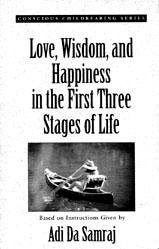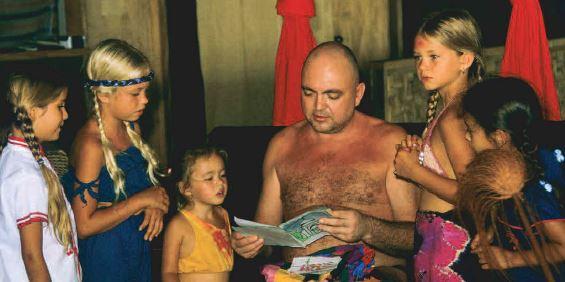The following is based on The Seven Stages of Life as given by Adi Da Samraj
Complied by Beezone

Are You Loved – Do You Love?
***
Consideration for Adults
- Do you generally trust yourself and others?
- Can you accept your personality without needing to “improve” constantly?
- Do you make decisions based on personal feelings or external opinions?
- Can you nurture yourself?
- Are you financially self-sufficient?
- Can you maintain eye contact during emotional conversations?
- Are you comfortable sharing the spotlight?
- Can you accept attention without discomfort?
- Are you adaptable to changes in routine?
- Are you comfortable being alone, or do you always seek company?
- Do you find joy in simple pleasures, such as nature, art, or quiet moments?
- Can you relax and enjoy downtime without feeling the need to be constantly productive?
- Do you experience a natural sense of calm, or are you frequently anxious or restless?
- Are you comfortable with your own pace, or do you often feel pressured to keep up with others?
- Can you handle criticism without feeling personally threatened?
- Do you seek validation from others, or do you feel satisfied with your own achievements?
- Can you feel secure in your decisions, even when they go against popular opinion?
- Do you find it easy to let go of grudges, or do you often hold onto past hurts?
- Can you ask for help when you need it without feeling diminished?
- Are you able to accept praise without deflecting or minimizing it?
- Do you have a strong sense of belonging, or do you often feel isolated?
- Are you able to forgive yourself for past mistakes and move forward with confidence?
- Can you maintain a sense of humor, even when things don’t go your way?
- Are you generally comfortable with physical affection, such as hugs or handshakes?
***

***
First Stage of Child Development (Ages 0-7)
Adi Da’s Model of the First Stage of Life: Foundations of Autonomy and Trust
In Adi Da’s comprehensive spiritual and developmental framework, the First Stage of Life spans from birth to approximately age seven. This stage establishes the groundwork for personal autonomy, trust, and basic contentment within a child’s first experience of the world. Adi Da’s teachings suggest that understanding and nurturing this initial stage is essential, as it profoundly impacts one’s ability to live in a state of peace and simplicity as an adult.
The Starting Point: The Child’s First Breath and Emergence of Autonomy
The journey of the First Stage begins with the child’s first breath, symbolizing a new independence as they enter the world. During these early years, the focus is on achieving basic autonomy, specifically through learning to care for bodily needs and managing simple tasks independently. This budding sense of self-sufficiency is fundamental to building confidence, providing the child with a stable foundation for future stages of growth.
Developmental Focus: Simple Autonomy and Engagement with Wonder
Primary Needs and Focus:
During this period, children express a natural drive for autonomy. They actively work to achieve simple forms of independence, such as managing bodily functions, dressing, and feeding themselves. The statement “I can do it all by myself” resonates with this stage’s core sentiment, underscoring the child’s desire to explore their own abilities.
Learning Style:
Children in this stage are highly receptive to the magical aspects of life. Their learning thrives in environments enriched with fairy tales, myths, and stories, which mirror their imaginative perception of reality. In this phase, they naturally relate to the world through a lens of wonder, which serves as an essential element of their cognitive and emotional development.
Potential Weaknesses: Imbalance and Unhealthy Traits
Despite the rich developmental potential in the First Stage, children may experience challenges if their needs are unmet or imbalanced. When deprived of secure and nurturing experiences, children may become lethargic or overly dependent. This stage’s unhealthy tendencies might manifest as “couch potato” behavior, where the child struggles with rest, lacks motivation, or clings to a passive, undifferentiated relationship with the world. These tendencies reflect a deeper struggle with simple autonomy and a reluctance to embrace the ease and trust that characterize a healthy First Stage.
Supportive Strengths: Simplicity, Delight, and Parental Guidance
Adi Da emphasizes the value of simplicity and delight as stabilizing forces during the First Stage. A child’s healthy development is supported through joyous experiences, where they feel safe and valued. Mature parental guidance also plays a crucial role, offering structure and reassurance that allow the child to explore their independence without fear. Parents who provide a balance of freedom and support encourage their children to confidently step into the world.
Imagery of Maturity and Health
Healthy Image:
A child who feels secure in this stage might be pictured as running freely down a path, embodying confidence and joy without needing constant oversight. This image reflects a child’s freedom to explore, learn, and interact with the world in a state of healthy independence.
Unhealthy Image:
Conversely, an image of an unbalanced First Stage might feature a child withdrawn on a couch, lacking motivation and energy, symbolizing the absence of healthy stimulation or encouragement to engage actively with the world.
Fullness and Happiness: The Heart of Simple Autonomy
At the heart of the First Stage is the child’s capacity to rest and trust in life’s basic pleasures. When this stage is fully supported, the child finds joy in simple comforts and learns to rest deeply within themselves. This sense of ease and security often takes on a symbolic expression through the heart, representing the calm and contentment that come with achieving basic autonomy.
Core Task and Mood: Rest and Contentment
The primary developmental task for this stage is rest. This goes beyond mere sleep; it’s about cultivating a state of being where the child feels comfortable, content, and at ease in their own company. While young children naturally seek protection and reassurance, the healthy expression of this stage involves transitioning from dependence on others to a contentment rooted in self-assuredness.
Signs of Unresolved First Stage Issues in Adults
Adi Da notes that adults who have not fully matured through the First Stage may struggle with issues around rest, trust, and stability. These individuals may find it difficult to remain still, struggle with basic relaxation, or feel perpetually unsettled. Their lack of comfort with themselves or their surroundings suggests unresolved needs from the earliest years of life.
Cultural and Archetypal Reflections: The Magic of Childhood and Early Perceptions
In a broader cultural context, the First Stage aligns with primitive and archetypal associations with magic and wonder. Mythically, this stage is reflected in beliefs that focus on surface appearances—much like the characters in Plato’s Allegory of the Cave, who perceive shadows on the wall as the full extent of reality. This symbolism reflects the child’s early relationship with the world, where their understanding is limited to immediate perceptions without deeper awareness or questioning.
Reflective Enquiry Questions for Adults (Related to First Stage)
Self-Trust and Confidence
- Do you generally trust yourself and others?
- Can you make decisions confidently without second-guessing yourself?
- Are you comfortable standing by your choices, even when they differ from others’?
- Can you feel secure in your decisions, even if they go against popular opinion?
- Are you able to forgive yourself for past mistakes and move forward confidently?
Self-Acceptance and Self-Sufficiency
- Can you accept your personality without feeling the need to “improve” constantly?
- Do you feel at ease with who you are, or do you often wish you were different?
- Are you financially self-sufficient?
- Can you nurture yourself physically, emotionally, and mentally?
- Do you feel content in your own company, or do you always seek out others?
Emotional Openness and Communication
- Can you maintain eye contact during emotional conversations?
- Are you comfortable sharing your feelings, even when they’re difficult?
- Do you feel at ease with receiving attention, or does it make you uncomfortable?
- Are you comfortable sharing the spotlight with others?
- Can you handle criticism or differing opinions without feeling personally threatened?
Self-Expression and Autonomy
- Do you make decisions based on personal feelings or external opinions?
- Are you comfortable pursuing interests that are unique to you?
- Can you maintain your pace in life without feeling pressured to keep up with others?
- Do you feel secure in your sense of style, interests, and identity, or are you easily influenced by trends?
Adaptability and Resilience
- Are you adaptable to changes in routine?
- Can you adjust your plans easily when things don’t go as expected?
- Are you able to let go of past disappointments or grudges, or do they linger?
- Can you stay calm in unfamiliar situations without feeling overwhelmed?
Contentment and Joy in Simplicity
- Do you find joy in simple pleasures, such as nature, art, or quiet moments?
- Are you able to relax without feeling guilty about being unproductive?
- Can you take pleasure in small accomplishments without needing external validation?
- Do you have a strong sense of belonging, or do you often feel isolated?
Comfort with Being Seen and Valued
- Can you accept compliments without deflecting or minimizing them?
- Are you comfortable receiving affection, such as hugs or handshakes?
- Do you feel worthy of recognition, or do you often feel you need to “earn” it?
Self-Compassion and Forgiveness
- Can you forgive yourself for making mistakes without harsh self-judgment?
- Are you able to laugh at yourself when things don’t go as planned?
- Do you feel at ease asking for help when you need it, or does it make you uncomfortable?
Summary
A key marker of maturity in the First Stage of Life, as described in Adi Da’s model, is a deep-seated sense of being loved and valued, which fosters an intrinsic sense of security. This inner security allows a person not only to feel at ease within themselves but also to extend love and understanding outward, even in challenging or unloving situations.
When someone is grounded in this feeling of being loved, they’re able to act from a place of compassion and resilience rather than reacting defensively or seeking validation from others. This capacity to love unconditionally, without needing constant reassurance, reflects a well-integrated First Stage—where the individual feels whole and secure enough to meet others with openness, even when the environment is less than nurturing.
“The liability in the first stage of life is attachment to an experiential state of undifferentiated physical unity with the elemental dimension of the world. It is the tendency toward dependence on what is finite. It is the tendency toward unconsciousness, or a dependent, vague, and sleeplike awareness of experience.”
The Way of Translation of Man into God – CHAPTER 7: The Enlightenment of the Whole Body
A healthy, First-Stage developed person does not take on the responsibility of compensating for others’ unmet needs or unresolved issues, especially when these manifest as blame, criticism, or constant demands for validation. Although they can empathize with others, they are not compelled to absorb or address others’ feelings of “not being loved” in a way that compromises their own boundaries.
Having developed autonomy and self-sufficiency, a mature First-Stage individual understands that while it’s possible to extend love and compassion, it’s equally important to respect and maintain their own stability. They won’t indulge others in cycles of blame or constant dependency, recognizing that true self-assurance doesn’t mean enabling or rescuing others from their unresolved struggles. Instead, they gently encourage others toward self-reliance and self-acceptance, modeling a balanced approach to autonomy, trust, and love.
This balanced perspective is a core part of the First Stage’s maturity: the capacity to love openly while also honoring one’s own self-sufficiency and boundaries.
Next: Second Stage of Life
